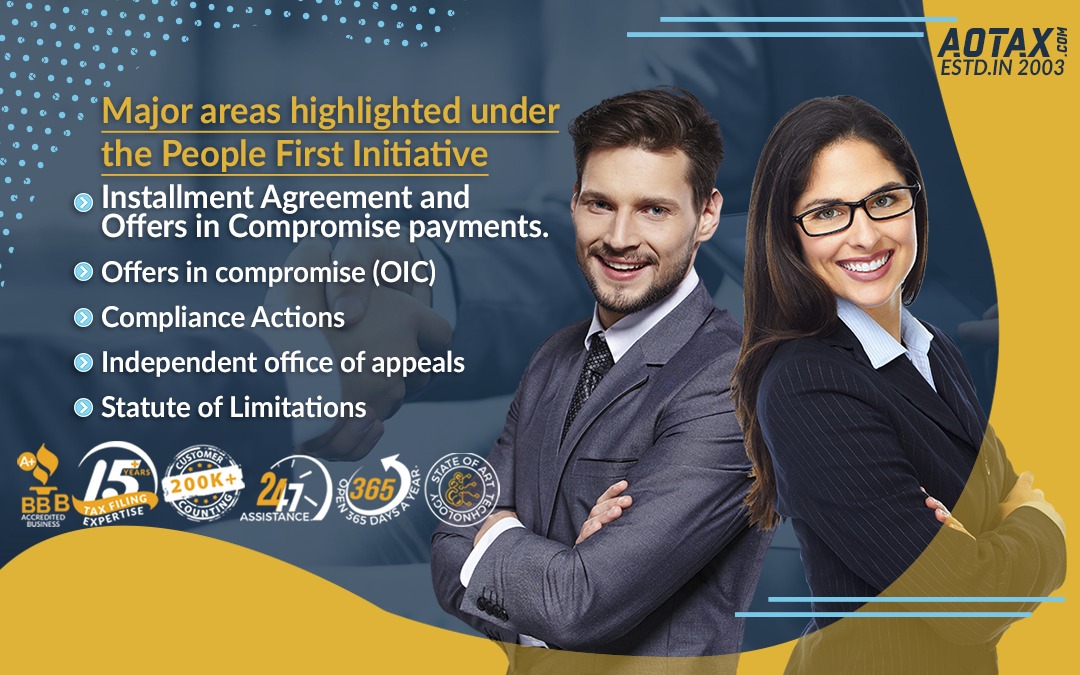People First Initiative: Everything you should know about this IRS initiative during the COVID-19 outbreak
The number of people affected by COVID-19 is going on increasing very rapidly and so are the challenges, issues faced by the common masses. In such a situation, the Internal Revenue Services (IRS) has announced a series of steps and guidelines which would help common people in providing some relief related to tax payment compliance. The IRS is highly concerned about the well-being and the working together of people.
The People First Initiative of the IRS has the main objective of helping those people who are facing economic issues and uncertainty in payment of taxes. This program implements temporary changes to the various IRS activities beginning on 1st April 2020 through 15th July 2020. These changes in the tax processes have been made temporarily by the IRS to help people and business entities during these difficult times.
- The new changes made by IRS include several issues which are ranging from the postponement of specific payments that are related to the Installment Agreements and Offers in compromise to the limiting of some enforcement activities.
- While some of the activities have been suspended temporarily other activities would move in the modified manner up to a maximum extent.
- Moreover, the IRS also would avoid any in-person contacts during this period.
Major areas highlighted under the People First Initiative
The major areas which have been mainly given importance under the People First Initiative are

A.Installment Agreement and Offers in Compromise payments
The IRS has offered expanded payment relief for the existing Installment Agreements and accepted the applications related to Offers in Compromise (OIC) until 15th July 2020. But, taxpayers must also be aware that any unpaid balances will get interest accrued on it as per the law.
For those installment agreements which already exist, the payments that are due between 1st April 2020 and 15th July 2020 are suspended. The IRS would not charge any default installment payment during this time. Those taxpayers who might find compliance with the Installment payment agreement and also with the Direct Debit Installment Agreement can suspend their payments during this time.
However, if a taxpayer is making the tax payments by mailing it or by visiting the IRS website then it is quite simple to stop the procedure. But, in case of direct debit payment, it might be difficult to suspend the process. Taxpayers will have to log in to the IRS website and change the payment information associated with the Direct Debit option.
B.Offers in compromise (OIC)
The various stages of OICs in which the IRS is helping the common people to resolve their issues are summarized below.
Pending OIC Applications–The IRS will not be closing any pending OIC requests before 15th July 2020 without obtaining consent from the taxpayers.
OIC Payments–Taxpayers will have the option by which they can suspend all the payments until 15th July 2020 on those OICs which have been accepted.
Delinquent return filings–Any delinquent return filings are pending for 2018 then the taxpayers must complete them by 15th July 2020.
New OIC Applications–Those taxpayers who have liabilities more than their net worth then the OIC process can be designed by using “Fresh Start” to resolve the issues of outstanding liabilities.
C.Compliance Actions
It has not been made clear from when the IRS would start the operations listed below. However, the IRS will not pursue any compliance actions unless those actions are necessary for the protection of the Government’s interest.
- New automatic system liens and levies would be suspended during this duration.
- Liens and levies which have been initiated by field revenue officers would be suspended during his time. However, the field revenue officers will keep on continuing high-income non-filers and would perform other such types of similar activities.
- For seriously delinquent taxpayers, IRS would suspend new certifications to the Department of State during this period. This certification will prevent the taxpayers from receipt or renewal of passports.
- If there are new delinquent accounts, then they will not be forwarded by the IRS to private collection agencies for performing the work during this period.
- New audits will not be carried off by the IRS during this period.
- The current audits might continue in some capacity but all those that happens in-person meetings are suspended.
D.Independent office of appeals
The Appeals office will continue their work on their cases. Appeals would not currently hold an in-person conference with the taxpayers. The conferences can be held over the phone through videoconferencing. Taxpayers can respond to any outstanding information request for all the cases in the Independent office of appeals.
E.Statute of Limitations
The IRS would take necessary steps for the protection of all applicable statutes of limitations. There can be instances where the statute expirations may be jeopardized during this period and taxpayers are encouraged to co-operate in the extension of such statutes.
Conclusion
Hence, the People First Initiative is mainly dedicated to helping the common people in having better lives during this period of crisis. The IRS team is committed to helping common people to get through this stressful situation. The IRS would keep on reviewing the “People First Initiative” and would make necessary changes whenever required. The taxpayers must extend their support and co-operation to the IRS as well to win over this tough situation together.
References
https://www.eisneramper.com/people-first-covid-0320/
https://www.taxwarriors.com/blog/irs-unveils-people-first-initiative


Recent Comments